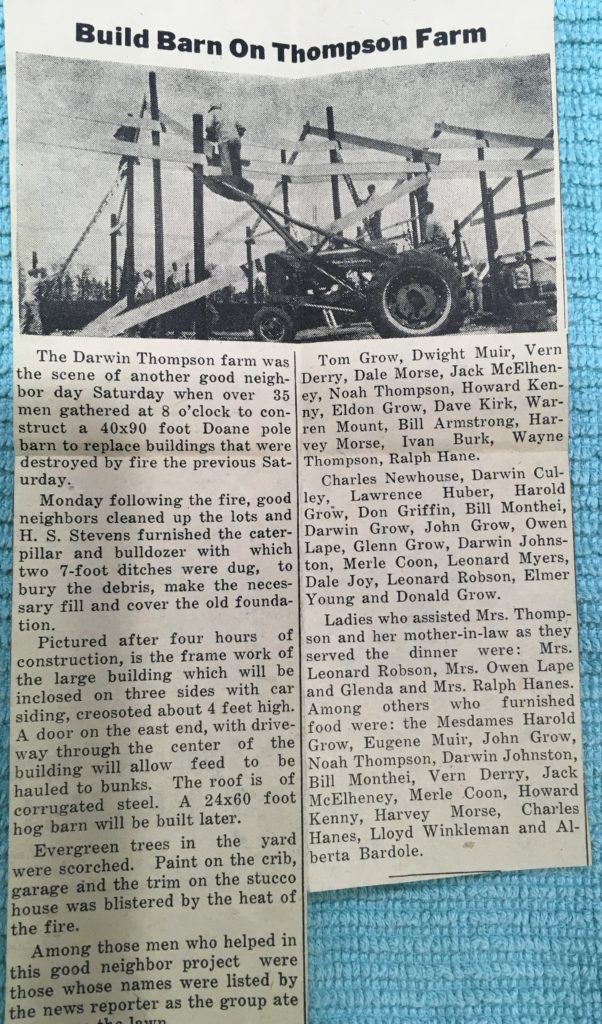What Do You Remember About Rippey?
The Rippey, Iowa, Sesquicentennial will be held on Saturday, August 1, 2020. If you have personal remembrances of Rippey, you are invited and encouraged to share those memorable stories. Just send your remembrance via email and we’ll get it posted on the Rippey News Web site, as well as on Facebook sites of the Friends of Rippey and the Rippey Sesquicentennial. You write down the anecdote or story–a page or two–and we’ll do the rest. Phyllis McElheney Lepke is serving as our volunteer coordinator and stories may be sent to her at Rippey150@gmail.com.
Neighbors helping neighbors is a part of rural Iowa life—and is captured in Carol Thompson Sieck’s “I Remember Rippey” story based in part on a conversation with her brother Dale, also of Rippey, and printed below. The barn built by their neighbors in 1956 still stands on the Thompson home place. Carol also provided a press clipping and photo of the barn raising, and she includes some very thoughtful insights into today’s social media culture compared to how she remembers growing up.
Neighbors Helping Neighbors Is A Part Of Rural Iowa Life by Carol Thompson Sieck
I suppose there are many reasons I am not very good at social media. All things “computer” seem difficult. It is quite likely my age is a factor, but I also suspect there is a cultural influence in my social media stumbles. I was raised in a world where people communicated by talking to one another.
I remember with fond clarity growing up on our family farm southwest of Rippey and feeling like my family was a part of a larger family, a family of neighbors. That larger family provided almost all of our social development skills, or lack of them. There were families with kids my age all around Us. The Young family lived across the road. The McElheney twins lived across the field from us. Families surrounded us, the Morse family, the Grow family, the Derry family, the Borgeson family, the Muir family. Also the McCurdys, Morses, Robsons, and Montheis. And it wasn’t just that they lived nearby, they were an active part of almost every aspect of our lives.
We kids all rode to and from school together every day. Our parents shared tools and farm implements. Our mothers formed their own neighborhood clubs in order to add an opportunity for the women to discuss community events from a female perspective. Our fathers baled hay together, sorted livestock together, castrated pigs together and pitched in any time one of them was in need of an extra hand. We worked together all through the week and then on Saturday night it was very likely these same families would finish their chores, get their Saturday night bath, and gather together at one home or another for an evening of crazy eights or pinochle around basement card tables while the kids played games upstairs. The week was complete when all these folks would gather once more in church on Sunday morning. Then the cycle would start again.
But the point of all this is that we did it all without texting or email or voice messaging. Of course, we didn’t have those options either. But did we need them? I know they are a convenience, and they somehow fit into my life today, but I’m glad I didn’t have them as a child. I think I would have missed a lot.
In 1956 I was six years old. To my best recollection I believe there were at least thirty-five families that lived within two miles of our rural Rippey farm home. We all filled each other’s needs and some of those needs were extreme. The spring of 1956 provided one of those extreme examples because it was about April of that year that we lost two large barns to a fire. We kids had been to Perry with Mom to get groceries and we could see the smoke from the Perry airport not yet knowing the catastrophe was ours. Various kinds of hardship had always been part of farm life but we were shocked at the fire’s devastation. Even more shocking, however, was what happened after. More than thirty-five, that’s right, 35 men gathered within one week’s time to complete the cleanup of debris and construction of a new barn, a genuine, old-fashioned barn raising. And it wasn’t just men. Entire families came. Children played in the yard and women prepared meals large enough to feed an army. Everyone pitched in. Everyone helped us just like we all helped each other. Doesn’t that seem amazing?
I know progress is good and necessary, but so is human contact. Tapping a Facebook “thumbs up” is just not the same as getting together with friends and neighbors to accomplish something good. Gardening together, sewing together, playing together, laughing together is still way better than Twitter. In short, I guess I’m satisfied with my social media limitations. I guess I’ll have to rely on plain old person-to-person socializing instead. It seems like that’s more how I was raised.


